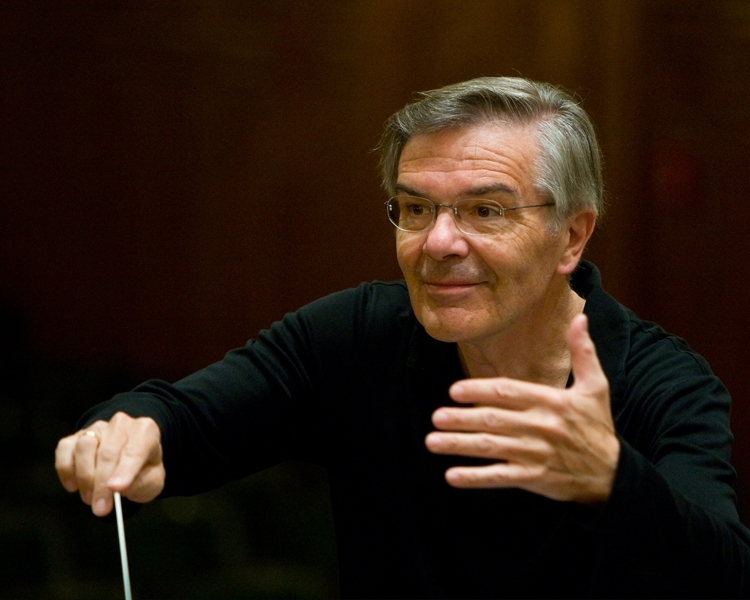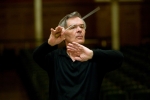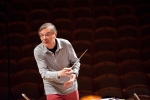
Prof. Milan Turkovic
Conductor
Offer / Categories
- Mental strength
- Motivation & goals
- Personality & success
- Management & leadership
-
Categories
- Artist performance
- Lecture / management seminar
- Meet & greet / guest of honour
- Discussion / interview
- Autograph session
Book Milan Turkovic
„Music is a holy art“ says Hugo von Hoffmannsthal, but it is also a "healing art!“
Offer
Keynote Speech: "Is a conductor a boss? A CEO of music making?"
Yes, he is to a good extent. Yet if rehearsals and concerts are to be successful he is also dependent on the goodwill of his orchestra. So he resembles in many ways the CEO of a business company. The former „hire and fire“ system in orchestras is long gone and today musicians in orchestras are socially well off and can stand their own ground opposite a conductor in case of differences in opinion. The situation varies though within different cultural groups. This can be discussed in detail. But the way of „teambuilding“ in economy and music is fundamentally different. To make music in an orchestra means that 30, 60 or even 100 musicians must follow the instructions of the conductor in a split second! The various instrumental groups within the orchestra must fulfill their tasks in perfect harmony and moreover fit their music into the sound of the entire orchestra.
Now you have in any orchestra people of different cultural or personal imprint and background. To coordinate those character traits and lead them into a perfectly timed and harmonious entity is one of the main tasks of a conductor. He must be endowed with a substantial capability of psychological empathy to be able to settle tensions within the orchestra. That means that 80 percent of the work of a conductor is done when he appears before his audience.
I have used the term „conductor“ strictly in its male form because as a matter of fact there are only very few female conductors as of now, less than female CEOs in our economy. Why this is the case shall be discussed in my speech.
The work of a conductor is, of course, tainted with stereotypes. Fact is, that he or she has to be an alpha male or female!
There is one particular topic I would like to discuss: If in today`s so popular Coaching Seminars a trainer promises to be able to turn his students into „Winners“ within a very short time it will certainly not be the case if someone wants to become a conductor. The requirements are much too complex.
Length of speech: as requested
Biography
Milan Turkovic is the descendant of an Austrian-Croatian family and was raised in Vienna where he studied the bassoon and conducting. Two decades ago he began to gradually change his carreer as bassoonist which had brought him fame in music centers all over the world into an intensive international activity as conductor.
Among the orchestras he conducted are the Symphonic Orchestra Vienna, the ORF Radio Symphonic Orchestra Vienna, the Vienna Chamber Orchestra, the Salzburg Camerata, the Orchestra Sinfonica Verdi di Milano, the Orchestra di Padova e del Veneto, the Orchestra Sinfonica die Roma, the Nagoya Philharmonic Orchestra, Philharmonia Prague, the Prague Chamber Orchestra, the Concert-Verein Vienna, the Philharmonic Orchestra Krakow, the Austrian-Hungarian Haydn Philharmonia, the Orchestra of the United Viennese Theaters and many more.
He was a welcome guest at various Festivals like the Haydn-Festival in Eisenstadt, the Carinthian Summer, the Mozart-Festival Salzburg, the Moritzburg Festival and the Kusatsu-Festival in Japan. With the German „Ensemble Selmer Saxharmonic“ he was awarded the ECO-Classic Award. Among his special projects is the Turkovic designed performance of „Salieri and Gran Partita“ together with Karl Markovics. This project was repeated with the wind instrument players of the Chicago Symphony Orchestra. He worked with famous soloists like Michael Schade, Sara Mingardo, Mischa Maisky, Benjamin Schmid, Jan Vogler, Sergei Nakariakov, Gabor Boldoczki, Wolfgang Schulz, Lise de la Salle, Karl Markovics and Erich Schleyer. In the years 2014 and 2015 he conducted a new production of Kurt Weills „Seven Cardinal Sins“ starring Maria Bill.
Furthermore he took part in the film „Tomcat“ from Händl Klaus and was a member of several juries and chairman of juries at international Music Competition.
Among the CDs conducted by Turkovic you will find an album with Haydn Symphonies presented by the „Concert-Ensemble Vienna“. Soloist Wolfgang Schulz on the flute, bassoonist Thomas Indermühle, Mozart`s „Gran Partita“ (Salzburg) as well as the CD „Flying Saxophone Circus“ with „Selmer Saxharmonic“ (ECO-CLASSIC-AWARD 2010) and the „Saxophone Cinema“. The popular Japanese music journal „Ongaku no tomo“ features Turkovic among the twenty most interesting conductors who ever performed in Tokyo.
As soloist Turkovic had guest appearances with many orchestras: Vienna Symphony Orchestra, Symphony Orchestra Bamberg, Chamber Orchestra Stuttgart, Chamber Orchestra Zurich, Camerata Salzburg, Chicago Symphony Orchestra, St. Louis Symphony Orchestra, the English Concert, Tonhalle Orchestra Zurich, Philharmonic Orchestra Munich, NHK Symphony Orchestra Tokyo and many more. At those occasions he worked with conductors like Giulini, Sawallisch, Marriner, Harnoncourt, Pinnock, Vegh, Stein, Brüggen and Eschenbach.
Turkovic was a founding member of the „Ensemble Vienna-Berlin“ whose member he was until 2009. From 1992 till 2012 he was a member of the Chamber Music Society of Lincoln Center, New York. From 1967 until 2012 he was bassoon soloist oft he „Concentus Musicus Vienna“. Numerous composers wrote works just for him, among them Ivan Eröd, Wynton Marsalis and Rainer Bischof. Turkovic performed at countless opening nights and debut appearances as soloist. Prominent among them are Sofia Gubaidulina, Jean Francaix and Thomas Daniel Schlee. A large part of his solo repertoire has been recorded on CD. He played Mozart`s bassoon concert four times, one recording on an archetype instrument with Harnoncourt, the Concert by C.M. von Weber twice (the second time under N. Marriner)
He was presenter of a music quiz on Austrian TV for two years. In 2013 his fourth book „Life in Vienna, experiencing Vienna“ was published by Kremayr & Scheriau. Earlier he published three music books „What musicians do during the day,“ „The strangest inhabitants of Vienna“ (also published in Japanese, by Residenz Publishing Company) and „Did you ever!“



